Types of Operating System in Computer
There are following types of operating system
- Batch Operating System
- Time-Sharing Operating System
- Real Time Operating System
- Multi-programming Operating System
- Network Operating System
- Distributed Operating System
Let’s have a look one by one.
1. Batch Operating System
This type of operating system does not interact with the computer directly. There is an operator which takes similar jobs having the same requirement and groups them into batches. It is the responsibility of the operator to sort jobs with similar needs.
Examples: Payroll System, Bank Statements, etc.
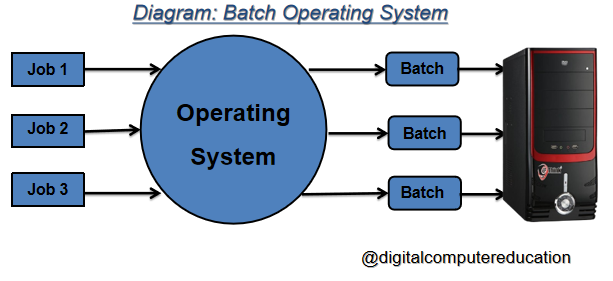
Advantages of Operating System:
- It is easy to manage large work repeatedly in batch systems.
- Multiple users can share the batch systems.
- The idle time for the batch system is very less.
Disadvantages of Operating System:
- If a job fails, the other jobs will have to wait for an unknown time.
- Batch systems are sometimes costly.
- Difficult to debug.
Types of Operating System in Computer
2. Time Sharing Operating System:
The Time Sharing Operating System is a type of operating system in which the user can perform more than one task and each task gets the same amount of time to execute. It is also called a multitasking operating system.
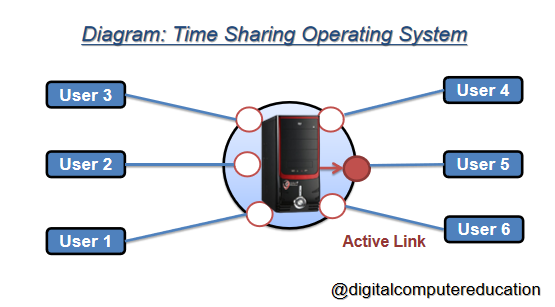
Advantages of Time Sharing Operating System:
- Each task gets an equal opportunity for execution.
- Reduction in the idle time of the CPU.
Disadvantages of Time Sharing Operating System:
- The data of each task should be handled properly so that they don’t
get mixed during the execution. - No way to give an advantage to the higher-priority task that needs
immediate execution.
Types of Operating System in Computer
3. Real Time Sharing Operating System:
In Real-Time Systems, each job carries a certain deadline within which the job is supposed to be completed, otherwise, the huge loss will be there, or even if the result is produced, it will be completely useless.
The Application of a Real-Time system exists in the case of military applications, if you want to drop a missile, then the missile is supposed to be dropped with a certain precision.
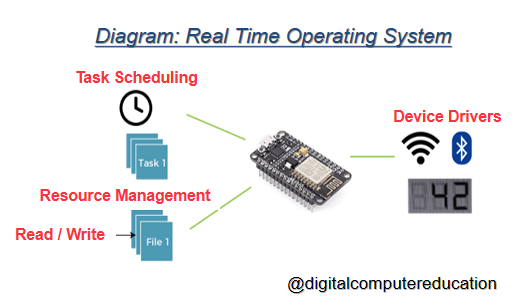
Types of Real Operating System:
- Hard Real Operating System
- Soft Real Operating System
- Firm Real Operating System
Advantages of Real Time Sharing Operating System:
- Maximum utilization of devices and resources.
- These systems are almost error-free.
Disadvantages of Real Time Sharing Operating System:
- Real-time operating systems are very costly to develop.
- Real-time operating systems are very complex and can consume critical CPU cycles.
Types of Operating System in Computer
4. Multi-Programming Operating System:
Multi-Programming is an extension to batch processing where the CPU is always kept busy. Each process needs two types of system time:
CPU time and IO time.
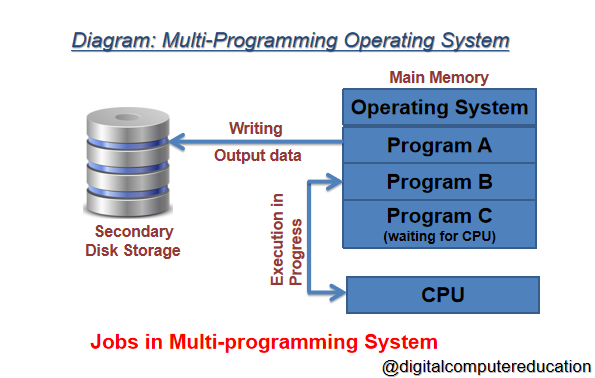
Advantages of Multi-Programming System:
- Throughout the system, it increased as the CPU always had one program to execute.
- Response time can also be reduced.
Disadvantages of Time Sharing Operating System:
Multi-Programming systems provide an environment in which various systems resources are used efficiently, but they do not provide any user interaction with the computer system.
Types of Operating System in Computer
5. Network Operating System:
A network operating system is software that connects multiple devices and computers on the network and allows them to share resources on the network.
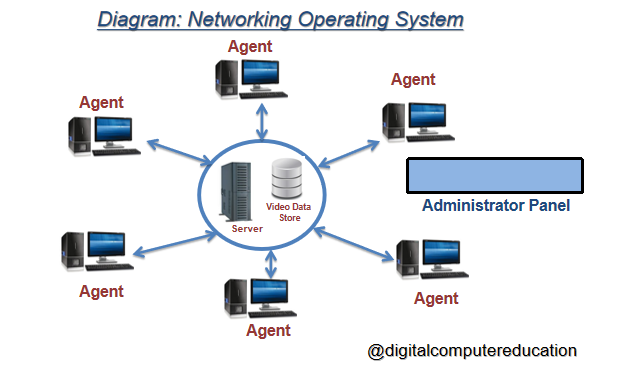
Advantages of Network Operating System:
- In this type of operating system, network traffic reduces due to the division between clients and the server.
- This type of system is less expensive to set up and maintain.
Disadvantages of Network Operating System:
- In this type of operating system, the failure of any node in a system affects the whole system.
- Regular maintenance and updates are required.
Types of Operating System in Computer
6. Distributed Operating System:
The Distributed Operating system is not installed on a single machine, it is divided into parts, and these parts are loaded on different machines. A part of the distributed Operating system is installed on each machine to make their communication possible. Distributed Operating systems are much more complex, large, and sophisticated than Network operating systems because they also have to take care of varying networking protocols.
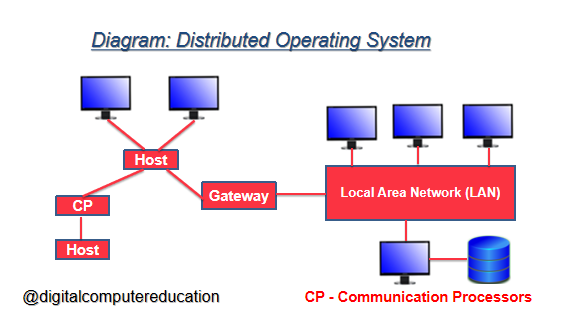
Advantages of Distributed Operating System:
- No single point of failure as we have multiple systems, if one fails, another system can execute the task.
- Resources are shared with each other, hence, increasing availability
across the entire system. - It helps in the reduction of execution time.
Disadvantages of Distributed Operating System:
- It is difficult to provide adequate security in distributed systems because the nodes as well as the connections need to be secured.
- Since the data is shared across the systems, it needs extra handling to
manage the overall infrastructure. - Network failure needs to be handled.
Types of Operating System in Computer
Read More: https://digitalcomputereducation.com/what-is-an-operating-system/
Know More: https://youtu.be/0Sxd8AFqOJc


1 thought on “Types of Operating System in Computer”